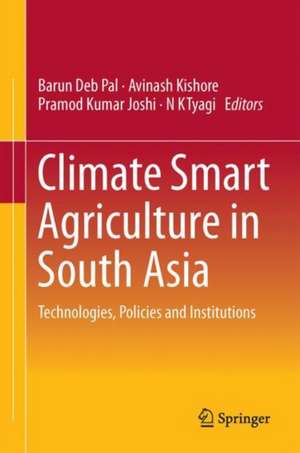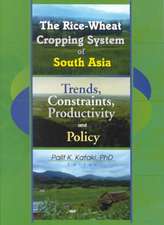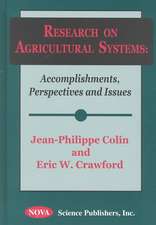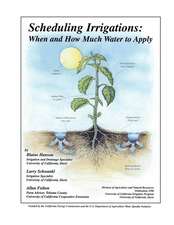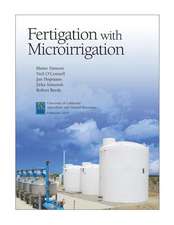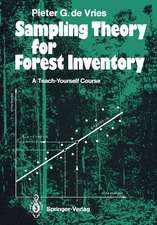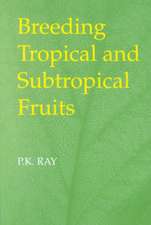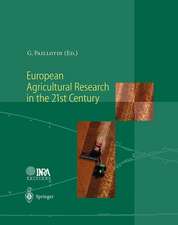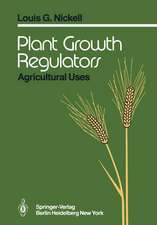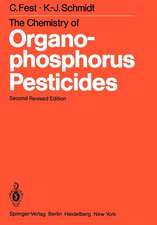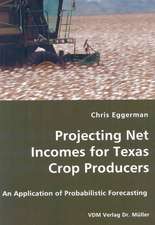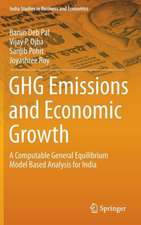Climate Smart Agriculture in South Asia: Technologies, Policies and Institutions
Editat de Barun Deb Pal, Avinash Kishore, Pramod Kumar Joshi, Narendra Kumar Tyagien Limba Engleză Hardback – 25 sep 2019
Further on, there is an analysis, using stated preference method, of the behaviour of farmers in adopting climate smart technologies. Preference of women farmers has been given a special focus in this book. After discussing the method priority setting of the farm technologies, impact of climate smart technologies has been analysed using real time data. Government policies have been reviewed with the view of achieving climate smart agriculture in South Asia. The book also describes the optimization modelling framework for investment allocation and technology prioritization. The model integrates both the bio-physical and the economic optimization model to capture the agro-climatic heterogeneity within the region and the variability of technical feasibility across regions and crops. Results of this model will help policy makers to identify how much to invest, where to invest and what technologies to prioritize for investments.
Preț: 1002.44 lei
Preț vechi: 1222.48 lei
-18% Nou
Puncte Express: 1504
Preț estimativ în valută:
191.84€ • 208.31$ • 161.15£
191.84€ • 208.31$ • 161.15£
Carte tipărită la comandă
Livrare economică 22 aprilie-06 mai
Preluare comenzi: 021 569.72.76
Specificații
ISBN-13: 9789811081705
ISBN-10: 9811081700
Pagini: 262
Ilustrații: XVI, 226 p. 39 illus., 34 illus. in color.
Dimensiuni: 155 x 235 mm
Greutate: 0.52 kg
Ediția:1st ed. 2019
Editura: Springer Nature Singapore
Colecția Springer
Locul publicării:Singapore, Singapore
ISBN-10: 9811081700
Pagini: 262
Ilustrații: XVI, 226 p. 39 illus., 34 illus. in color.
Dimensiuni: 155 x 235 mm
Greutate: 0.52 kg
Ediția:1st ed. 2019
Editura: Springer Nature Singapore
Colecția Springer
Locul publicării:Singapore, Singapore
Cuprins
Chapter 1: Two way association between agriculture and climate change.- Chapter 2: Prioritizing climate smart interventions across various agro-climatic region.- Chapter 3: Adoption of climate smart technologies in Indo-Gangetic Plain in South Asia.- Chapter 4: Role of Women in adoption of climate smart technologies and practices in drought prone zone.- Chapter 5: Were the past government policies climate smart? A review for South Asia.- Chapter 6: Insurance, compensation and institutions for climate smart agriculture.- Chapter 7: Prioritizing investment for climate smart agriculture – A Bio-Economic model.- Chapter 8: Climate smart agriculture – a need indeed for future agricultural development in South Asia.
Notă biografică
Dr Barun Deb Pal is a Program Manager at the International Food Policy Research Institute (IFPRI) - South Asia chapter, New Delhi, India. He received his Master’s in Economics from the University of Calcutta, India and his PhD from Jadavpur University, Kolkata, India. He has more than 10 years of experience in economic policy modelling with a special focus on climate change policy analysis. He has many research articles and books to his credit. His most recent articles have been published in the Journal of Economic Structures, Economic Systems Research, Journal of Science and Technology, and his co-authored book “GHG Emissions and Economics Growth – A Computable General Equilibrium Model Based Analysis for India” was published by Springer.
Dr Avinash Kishore obtained his Master’s in Public Affairs from Princeton University, USA and his PhD in Public Policy from Harvard University, USA. He is interested in agriculture, environment, and development economics. Atthe International Food Policy Research Institute (IFPRI) South Asia chapter, New Delhi, India he is working as a Research Fellow and is engaged in research projects that seek to bridge the gap between laboratories and farms in Indian agriculture using action research in collaboration with agricultural universities, agribusiness firms and farmers. He has published more than 15 articles in journals of international repute like Water International, Water Policy, Food Policy, Economic Development and Cultural Change and Economic and Political Weekly.
Dr Pramod Kumar Joshi is Director of the IFPRI - South Asia chapter, New Delhi, India. His areas of research include technology policy, market, and institutional economics. Dr Joshi is a recipient of many awards such as the Dr MS Randhawa Memorial Award of the National Academy of Agricultural Sciences (2009–11), Prof RC Agarwal Lifetime Achievement Award of the Indian Society of Agricultural Economics, DK Desai Award of the Indian Society of Agricultural Economics, and RT Doshi Foundation Award of the Agricultural Economics Research Association for outstanding contributions in social science and agricultural economics research. He is a Fellow of the National Academy of Agricultural Sciences and the Indian Society of Agricultural Economics. He served as a member of the International Steering Committee for the Climate Change, Agriculture, and Food Security Challenge Program, led by the ESSP Science Community and the Consultative Group on International Agricultural Research (CGIAR) (2009–11).
Dr. Narendra Kumar Tyagi is an independent researcher in the agricultural science discipline and he is based in Ghaziabad, Uttar Pradesh, India. Dr. Tyagi graduated in Agricultural Engineering from GBPUAT, Pant Nagar in 1967, obtained Master's degree in Soil and Water Conservation Engineering from IIT Kharagpur in 1969 and PhD in Civil Engineering from JNTU Hyderabadin 1984.He attended USU Logan, USA, for Post-Doctoral Research in Environmental Planning for Salinity Control. His professional career spans over more than three decades and he known for his outstanding research in land and water management. During his long professional career, he served various key positions in ICAR including Director of Central Soil Salinity Research Institute, Karnal 1994-2004; Member, Agricultural Scientists' Recruitment Board, New Delhi between 2005 and 2011.
Dr Avinash Kishore obtained his Master’s in Public Affairs from Princeton University, USA and his PhD in Public Policy from Harvard University, USA. He is interested in agriculture, environment, and development economics. Atthe International Food Policy Research Institute (IFPRI) South Asia chapter, New Delhi, India he is working as a Research Fellow and is engaged in research projects that seek to bridge the gap between laboratories and farms in Indian agriculture using action research in collaboration with agricultural universities, agribusiness firms and farmers. He has published more than 15 articles in journals of international repute like Water International, Water Policy, Food Policy, Economic Development and Cultural Change and Economic and Political Weekly.
Dr Pramod Kumar Joshi is Director of the IFPRI - South Asia chapter, New Delhi, India. His areas of research include technology policy, market, and institutional economics. Dr Joshi is a recipient of many awards such as the Dr MS Randhawa Memorial Award of the National Academy of Agricultural Sciences (2009–11), Prof RC Agarwal Lifetime Achievement Award of the Indian Society of Agricultural Economics, DK Desai Award of the Indian Society of Agricultural Economics, and RT Doshi Foundation Award of the Agricultural Economics Research Association for outstanding contributions in social science and agricultural economics research. He is a Fellow of the National Academy of Agricultural Sciences and the Indian Society of Agricultural Economics. He served as a member of the International Steering Committee for the Climate Change, Agriculture, and Food Security Challenge Program, led by the ESSP Science Community and the Consultative Group on International Agricultural Research (CGIAR) (2009–11).
Dr. Narendra Kumar Tyagi is an independent researcher in the agricultural science discipline and he is based in Ghaziabad, Uttar Pradesh, India. Dr. Tyagi graduated in Agricultural Engineering from GBPUAT, Pant Nagar in 1967, obtained Master's degree in Soil and Water Conservation Engineering from IIT Kharagpur in 1969 and PhD in Civil Engineering from JNTU Hyderabadin 1984.He attended USU Logan, USA, for Post-Doctoral Research in Environmental Planning for Salinity Control. His professional career spans over more than three decades and he known for his outstanding research in land and water management. During his long professional career, he served various key positions in ICAR including Director of Central Soil Salinity Research Institute, Karnal 1994-2004; Member, Agricultural Scientists' Recruitment Board, New Delhi between 2005 and 2011.
Textul de pe ultima copertă
This book discusses various climate smart agro-technologies, their technical and economic feasibility across heterogeneous agro-climatic conditions, assessing farmers’ willingness to adopt those technologies, impact of climate smart technology in agricultural production and possible policy and investment opportunities to upscale it. Containing eight chapters, the book starts with a discussion about the methodological aspects of priority setting of the farm technologies across various regions of South Asia including Eastern Indo-Gangetic plain, Western Indo-Gangetic Plain and arid regions. Using data from field based trials and expert solicitations, the book next deliberates on a list of feasible technologies, assessed by constructing climate smart Feasibility Index.
Further on, there is an analysis, using stated preference method, of the behaviour of farmers in adopting climate smart technologies. Preference of women farmers has been given a special focus in this book. After discussing the method priority setting of the farm technologies, impact of climate smart technologies has been analysed using real time data. Government policies have been reviewed with the view of achieving climate smart agriculture in South Asia. The book also describes the optimization modelling framework for investment allocation and technology prioritization. The model integrates both the bio-physical and the economic optimization model to capture the agro-climatic heterogeneity within the region and the variability of technical feasibility across regions and crops. Results of this model will help policy makers to identify how much to invest, where to invest and what technologies to prioritize for investments.
Caracteristici
Links the concept and components of climate smart agriculture with the existing government interventions for agricultural development in South Asia Delineates policy options and institutional arrangements to accelerate adoption of climate smart agriculture in the region Provides future directions of agricultural research under progressive climate change impacts
